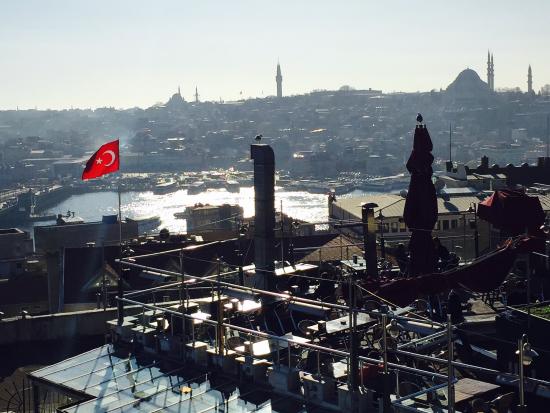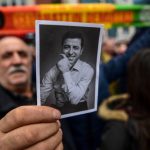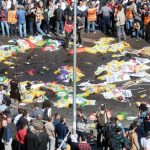“Istanbul never leaves you – its beauty pulls you back,” a friend told me as I packed up my life here.
After five years it was time to leave, and I recalled with a smile what a senior editor in London told me back in 2014: “Ah yes, Turkey… it slightly struggles to break through on air.”
So what happened to those languid evenings by the Bosphorus, watching the sun go down behind the minarets?
Instead, I reported on one of the most turbulent times in the country’s modern history: terror attacks – dozens of them; the migrant crisis; the bloody, failed coup; the purge that followed; the conflict with Kurdish militants; the spillover from Syria. The list goes on.
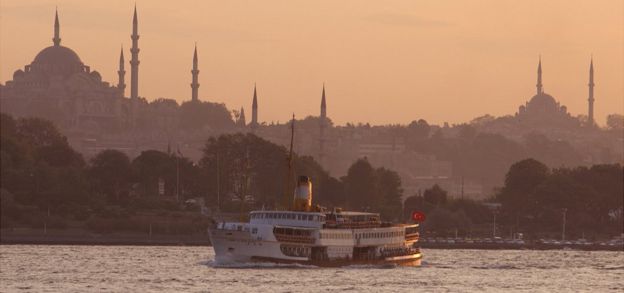
Books published in the early 2000s were full of optimism about Turkey and its leader, Recep Tayyip Erdogan.
He seemed to marry Islam and democracy in the post-9/11 world, when the West craved a partner in the Middle East.
He stopped the military marching into power here, reformed the economy, empowered religious Turks, who had long felt scorned by a secular majority, and made Turkey a candidate for EU membership.
What changed?
It’s hard to pinpoint exactly when that image of Mr Erdogan – and of Turkey – changed. Maybe the mass anti-government protests of 2013 over his plan to build on Gezi Park, one of central Istanbul’s rare green spaces.
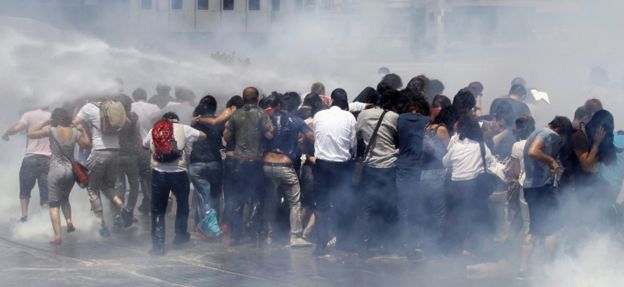 Image copyrightREUTERS
Image copyrightREUTERSOr perhaps the split between him and the Gulenists, a rival Islamic faction that had infiltrated every sector of society, and which he blamed for the July 2016 attempted coup.
Or maybe simply the world was changing. Europe was becoming more insular, nationalism was rising. And, in the UK, Turkey became part of the Brexit debate, linked negatively with mass immigration.
I moved to a Turkey drifting away from hope; it felt increasingly polarised.
Kurdish rebels
In 2015 fighting resumed between Kurdistan Workers Party (PKK) militants and the Turkish state – a separatist insurgency that has cost some 40,000 lives over the decades.
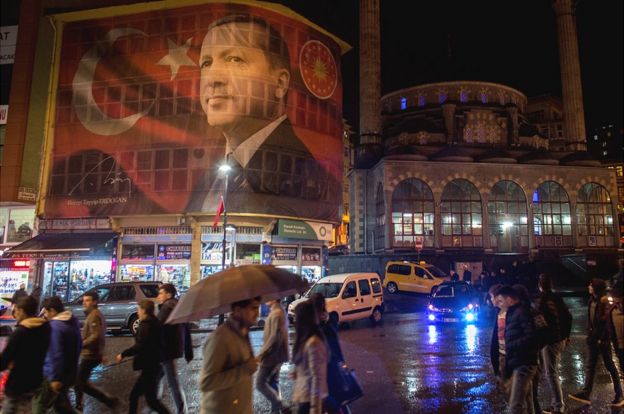 Image copyrightGETTY IMAGES
Image copyrightGETTY IMAGESKurdish-majority southeast Turkey was filled with roadblocks, manned by angry teenagers in balaclavas whose brothers were fighting in the mountains for the PKK – designated a “terrorist” group by Turkey, the US and EU.
In Diyarbakir, the region’s main city, I roamed among tanks and heavily-armed police, hearing bursts of automatic gunfire and the boom of shells.
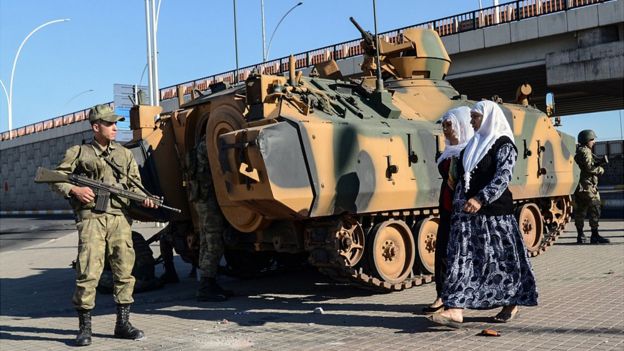 Image copyrightAFP
Image copyrightAFPI remember the steely gaze of Emine Cagirga, as she recalled her 10-year-old Cemile, shot dead outside her house during a police operation.
Emine showed me the fridge where she had kept her daughter’s body for two days, so it wouldn’t decay.
Nor will I forget the mourners’ wailing at the funerals of Turkish policemen and soldiers – victims of PKK roadside bombs.
Then there were terror attacks from the Islamic State group. Among their targets was Istanbul airport. I flew into it as the carnage unfolded.
IS bombers infiltrated from war-torn Syria to blow up political gatherings, tourist streets and an Istanbul nightclub on New Year’s Eve 2016.
The most heart-breaking interview of my time here was with Ali Alsaho, one of the many Syrian refugees who made it to Turkey, bound for Europe. He had paid smugglers extra for a wooden boat, supposedly safer than a rubber dinghy. Fifteen minutes into the crossing, it filled with water. His wife and seven children drowned, the youngest just 20 days old.
There were countless other tragic stories from the refugees. Nearly four million are now in Turkey – more than in any other country.
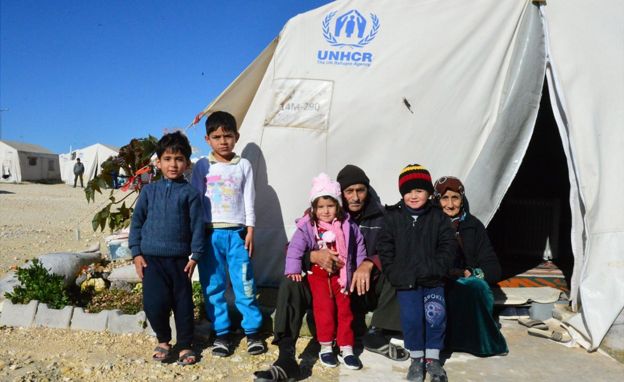 Image copyrightGETTY IMAGES
Image copyrightGETTY IMAGESDespite that generosity, there is much paranoia here. It is partly the legacy of the nationalist identity first built by Kemal Ataturk, the modern state’s founder.
“One, two, three, long live the Turks,” goes an old children’s rhyme for learning to count. It continues: “four, five, six, Poland collapsed. Seven, eight, nine, the Germans are pigs. Ten, eleven, twelve, the British are foxes.”
Try Googling “Erdogan slams…” and you’ll be spoilt for choice: Nato, the US, Israel, Europe, “so-called intellectuals” and, of course, the BBC.
I kept the front page of a Turkish newspaper labelling me “a British traitor who should be captured and deported” for daring to interview opposition activists.
How Erdogan cracked down on dissent
When mutinous soldiers tried to take power in 2016 suspicion immediately fell on outside forces.
The coup, which killed some 260 people, was a turning-point. It further emboldened Mr Erdogan, who launched a purge of around 250,000 people, jailed, sacked or suspended.
I’ll never forget the words of an 82-year-old neuropsychologist I interviewed soon after. She had been stripped of her pension and baselessly branded a “terrorist supporter”.
“My husband and I fled Turkey after the 1971 coup,” she said. “There was widespread torture – leftists like us would have fingernails pulled out in custody.” She paused, gazing at the gleaming Bosphorus. “But today it’s worse, because at least then we could trust the judiciary.”
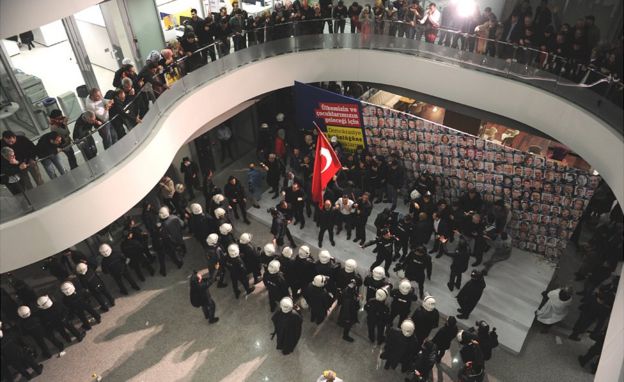 Image copyrightAFP
Image copyrightAFPTo see journalists and human rights defenders, some of them friends, locked up or chased out on spurious charges has been tough.
At a party soon after I arrived in 2014, a Turkish woman, Melis, asked me with a warm smile: “So you’re new here, huh?”
“One thing you have to learn about us is we’re militant people. Whether religious, secular, militaristic, Ataturk-loving, Erdogan-loving, or even how we party – we do it all 110%.”
How true those words ring. This is a nation of huge characters, strong spirits, forceful natures. It, and I, will always be marked by these tempestuous, fascinating five years.
Source: BBC
